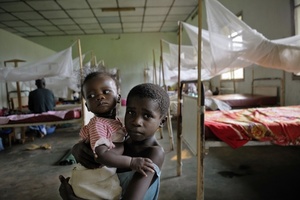In the fight against AIDS, TB and malaria, we should be dealing a knock-out blow, not lowering our guard
The announcement by the Global Fund to Fight AIDS, Tuberculosis and Malaria that it has to cancel its new round of funding applications could hardly have come at a worse time. For me, as for thousands of other health workers at Médecins Sans Frontières (MSF) and elsewhere, it feels like a punch in the face. Just when years and years of hard work bring hope that we can push back the three diseases that kill millions every year, funding dries up. With little room for manoeuvre in their fight against AIDS, TB and malaria, ministries of health in the hardest-hit countries may see hard-earned progress disappear.
MSF’s treatment programmes are mainly funded by the contributions of private individual donors, but ministries of health rely heavily on the Global Fund to Fight AIDS, Tuberculosis and Malaria. Set up in January 2002, the Fund has become a lifeline to millions in the countries where MSF works; it estimates that this funding stream has directly contributed to preventing an average of one million deaths per year. We have seen ministries of health successfully run ambitious programmes that they never could have dreamed of without outside support.
But the Global Fund is facing an unprecedented financial crisis. Because donor countries have withheld their financing, it has told recipient countries that it will not fund any new proposals until 2014. For a number of countries this will mean putting scale-up of effective AIDS, TB or malaria treatment on hold. Without funding, health ministries will be forced to ration care, and scientific advances will remain out of reach. And this at a time when they could successfully be pushing back all three diseases.
Take AIDS. Ten years ago, in countries like Thailand and South Africa, MSF piloted programmes that challenged the very notion that treatment couldn’t be rolled out in poor communities. This year, thirty years into the epidemic, research has delivered the evidence that HIV treatment itself could be the best way to end the pandemic. A person put on treatment earlier is 96 per cent less likely to pass the virus on to others.
HIV treatment can be a key tool for HIV prevention. We now have a historic opportunity to reverse AIDS. At this crucial time, the Global Fund should be empowering countries to seize this opportunity to implement bold programmes to turn the tide of the epidemic. It should be doing so by providing predictable and sustainable funding. But instead ministries of health have been told to put their ambitions on hold.
Take tuberculosis. For the first time, the number of TB cases worldwide is on the decline, although it remains shockingly high, and more lethal, drug-resistant forms of TB are on the increase. Here, too, treatment is prevention: if people are on treatment, they are less infectious. A new advance in diagnostic technology has improved our ability to determine who has drug-resistant TB and therefore to put them on the right treatment. Scaling up is now a matter of urgency.
Take malaria. The combination of providing bednets to prevent malaria and effective combination therapy to treat the disease have already reduced incidence. A landmark clinical trial in 2010 showed that better treatment for severe forms of malaria in children can dramatically reduce death rates. But kids continue to be treated with quinine, which is cheaper, but far less effective. And malaria continues to kill hundreds of thousands of people every year, most of them small children. While prevention remains the mainstay of the fight against malaria, MSF has estimated that switching treatment for severe forms would cost around $30 million more, but can save 200,000 lives per year.
There has never been a better time to square up to these three diseases. With the experience and knowledge that we have today, ministries of health can dramatically reduce the number of people getting infected and dying, provided they can initiate additional programmes and scale up existing ones.
There are countries like Uganda that want to double the rate at which people are put on to HIV treatment. There are those like Uzbekistan that have plans to significantly increase the number of drug-resistant TB patients receiving treatment. But with the Global Fund unable to contribute the resources, how will countries take that step? If the donors have virtually told the Global Fund to shut its doors to new business, where will the money come from?
The Board of the Global Fund must raise the alarm. Instead of accepting rationing, and cancelling ambitions, we urge the Global Fund Board to organise an emergency donor conference to renew commitment and allow countries where the diseases are endemic to apply for funding in 2012.
In my work with MSF, I have seen people die from AIDS, from TB, from malaria. But in recent years, I have most of all seen people survive these diseases. The Global Fund is a crucial part of the most ambitious health project in history, and millions of people are testimony to its success simply by being alive today. If we squander the opportunity we have now to deal these diseases a fatal blow, how will history judge us?
By Dr Unni Karunakara
Dr Unni Karunakara is International President of Médecins Sans Frontières (MSF), an independent medical humanitarian organisation that works in more than 60 countries. In 2010, MSF provides HIV treatment to more than 180,000 people in nearly 20 countries, TB treatment to 30,000 patients, and malaria treatment to 1.6 million.
Médecins Sans Frontières


